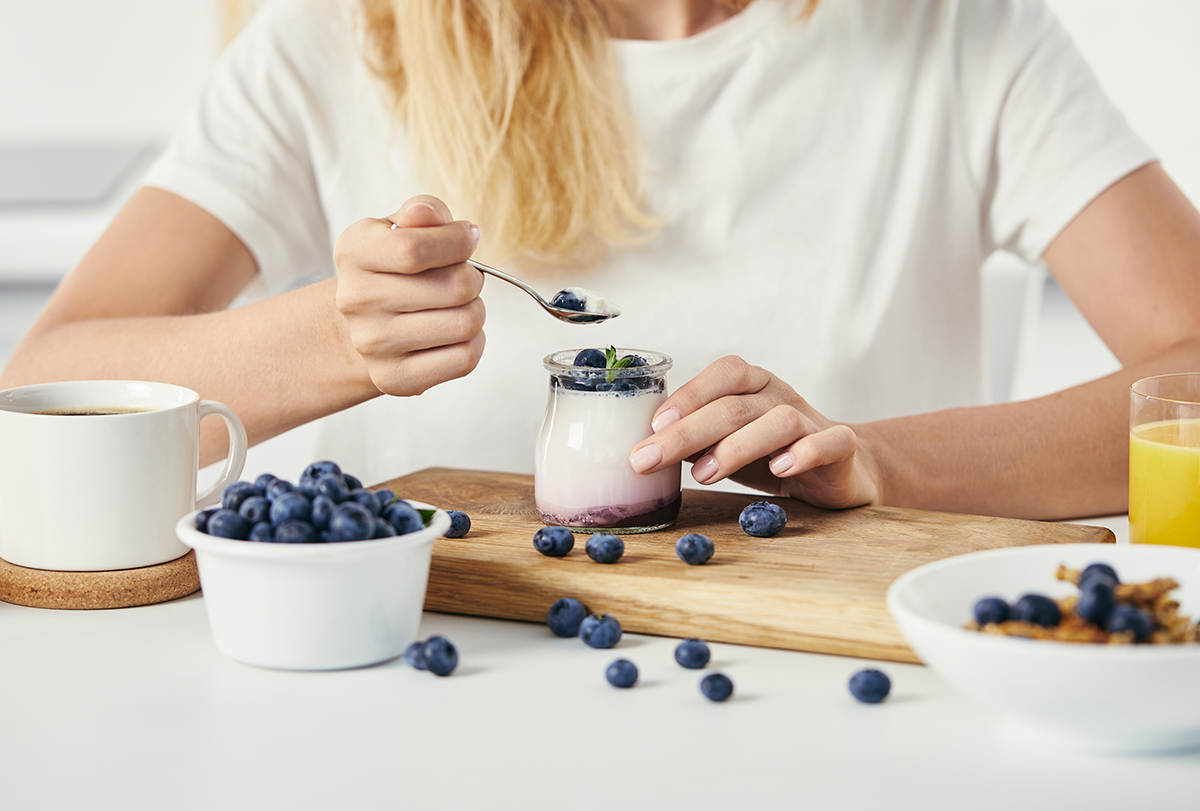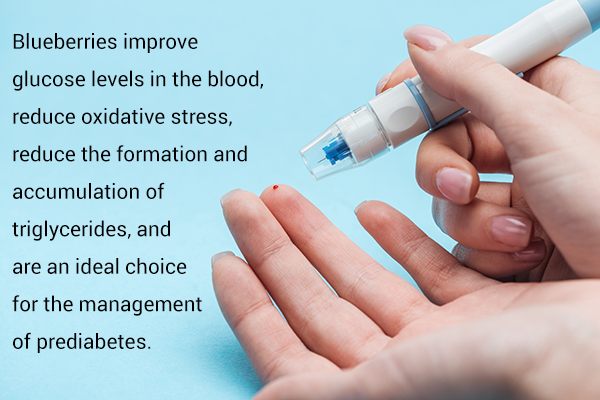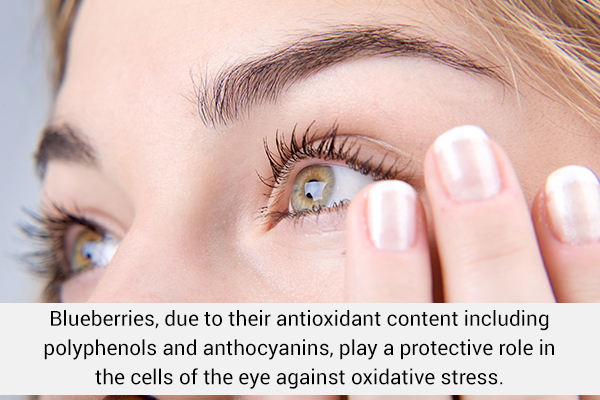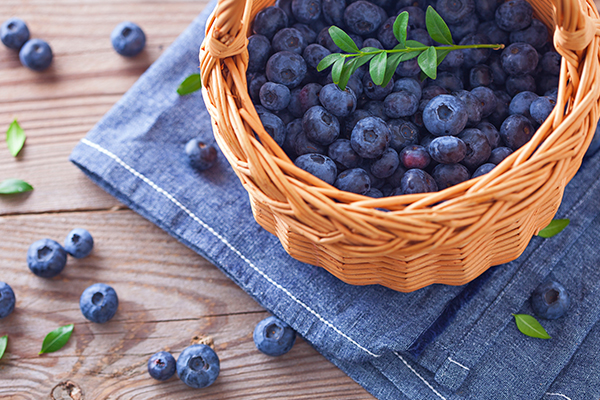In this article:
Blueberries – the round blue/purple berries – have gained immense popularity as functional foods due to their variety of health benefits. They are versatile and add a pop of color to any dish, making it very favorable for children.

These small berries are filled with polyphenolic compounds that act as antioxidants. They are the richest sources of anthocyanins, which give the berries their unique color. (1)
In fact, intake of only 1⁄3 cup of blueberries each day can reduce the risk of many diseases. (1)
Nutritional Information of Blueberries
One cup (148 g) of blueberries contains only 84 calories, making them a low-calorie food. One cup also provides 3.6 g of fiber, contributing to 14% of the daily requirements of fiber.
Blueberries are also rich in vitamin C (14 mg), vitamin K (29 mcg), manganese (0.5 mg), and potassium (114 mg). They are low-density food with 125 g of water in each cup. (2)
Health Benefits of Blueberries
Here are some of the benefits of consuming blueberries.
1. Protects against heart diseases
Heart diseases are one of the most concerning causes of death across the world and affect people of any age. Diet can play a crucial role in preventing and managing the disease.
Due to their high anthocyanin and antioxidant content, blueberries have a positive impact on cholesterol and glucose uptake by cells. (1)
Studies have reported that high intakes of anthocyanin-rich foods are associated with a lowered risk of heart attacks by about 32%. (3)
In a review of several studies, blueberry consumption reduced cholesterol and fasting glucose levels, decreased inflammation, and reduced markers of diabetes. (4)
2. Controls diabetes

According to the American Diabetes Association, blueberries are a diabetes superfood.
Blueberries improve glucose levels in the blood, reduce oxidative stress, reduce the formation and accumulation of triglycerides, and are an ideal choice for the management of prediabetes. (5)
Studies have also shown that daily consumption of 150 g of blueberries reduced glucose in the blood after eating and improved post-meal insulin. (6) This benefit is attributed to the presence of anthocyanins in blueberries.
3. Aids weight loss
High in fiber, low in calories, and high in water content, this little fruit is a great choice in a weight loss plan.
Studies have suggested that blueberry consumption might prevent obesity. In a study conducted on mice on a high-fat diet, blueberry anthocyanins inhibited weight gain by almost 55% and also reduced free fat in the blood and liver. (7)
In humans with obesity, the consumption of blueberries reduced the inflammatory markers associated with obesity. (8)
Though more extensive human trials are needed with repeated results, it can be safely said that one serving of blueberry per day can effectively help in achieving weight loss.
4. Improves digestion

The polyphenols in blueberries are known to influence gut microbes, leading to an increase in the strains of good bacteria. They also reduce the symptoms of stomach inflammation, even showing some benefits for colon cancer. (9)
Blueberries, through their fiber, also add bulk to the stool and aid its movement along the intestines, thereby easing the symptoms of constipation. (10)
5. Maintains nerve health and improves memory
Blueberries have been studied for their role in lowering disease risks of Parkinson’s disease and Alzheimer’s disease. (1)
These berries also protect nerves against damage due to their anti-inflammatory activity. They also improve the signaling and communication between neurons. (11)
Cognition and memory were also reportedly improved in children after consuming a blueberry drink, (12) prompting more research in the area. Moreover, in another study, drinking concentrated blueberry juice also improved brain function in older adults. (13)
6. Preserves vision and eye health

The retina of the eye is most prone to damage due to oxidative stress. (1)
Blueberries, due to their antioxidant content including polyphenols and anthocyanins, play a protective role in the cells of the eye against oxidative stress. This can reduce the risk of retinal diseases as well as improve overall vision. (14)
Tests done on human cells of the eye showed a positive impact of blueberry anthocyanins in the prevention of retinal diseases. (15)
7. Fights against urinary tract infections
Like their close cousin cranberry, blueberries also exhibit some protection against urinary tract infections (UTIs).
One study showed that the anthocyanin derived from blueberry demonstrated anti-adhesion activity against bacteria that cause infections. (16) This means it prevents bacteria from sticking to the walls of the urinary tract, effectively preventing infections.
Though blueberries aren’t as widely studied as cranberries, they are likely to have the same potential in managing UTIs.
8. Aids muscle recovery post-workout
The antioxidants in blueberries can help reduce soreness and muscle fatigue following a session of strenuous workout. In a small study of 10 athletes, post-exercise recovery was faster with the consumption of blueberry smoothie. (17)
Blueberries are also a good low-calorie fruit with a high water content that may help with hydration post-workout.
9. May help slow down aging

Aging occurs when the body’s cells grow old and cannot continue with their normal functions as before. Deficiencies, hormonal imbalances, UV exposure, pollutants, and inflammation can all contribute to the aging process. (18)
Polyphenols such as those found in blueberries act as antioxidants and get rid of the harmful substances in the body, slowing down the aging process. They reduce the aging of nerves and prevent age-related memory decline. (18)
10. May fight cancer
Blueberries are recently being exploited for the role they may play in the prevention of various types of cancers including breast cancer, liver cancer, colon cancer, prostate cancer, and even oral and cervical cancers. (19)
Recent studies have shown blueberry to exhibit this protective ability by preventing the formation and growth of cancer cells. They also inhibit their multiplication and reduce the chances of a cancer reoccurring. (19)
Blueberries may also weaken the cancer cells, sensitizing them to radiation so that even lower doses of radiation can be effective in treating cancer. (18) Extensive studies and human trials are needed to establish the validity of these results.
Precautions to Consider

- As blueberries are small, it is easy to overconsume these fruits without realizing it. However, an excess of the nutrients in blueberries may be harmful.
- Do not consume the fruit if you have allergies.
- It is better to consume the fruit fresh and not juiced as the fiber content can go down.
- Processing blueberries including freezing, drying, canning, or making jams and preserves can result in the loss of anthocyanins. Therefore, it is highly recommended to consume fresh blueberries as much as possible. (1)
- Choose fruits that have a deep hue to them and are round and plump with a whitish bloom intact on the skin. Wash the fruit only before consuming them.
Most-Asked Questions About Blueberries
How many blueberries can I eat in a day?
One cup of blueberries each day is recommended to reap their benefits.
How long do blueberries last in the fridge?
They will usually last for a week in the fridge, but as cold temperatures have been reported to bring down their total anthocyanin content, it is advisable to consume them fresh. Storing in the fridge or freezer doesn’t affect other nutrients in blueberries.
Are blueberries high in sugar?
Blueberries are moderately high in sugar, giving about 14.7 g per cup. (19) This can be comparable to eating a small orange or apple. The high amounts of fiber in blueberries can attenuate the release of sugar into the blood.
Moreover, combining them with a nut such as almond, walnut, or pistachio can create a good and healthy protein-fruit combination that is effective for people with diabetes.
Final Word
Harboring a world of goodness in their tiny body, blueberries are being researched as a functional food. Their health benefits are largely attributed to their polyphenol and antioxidant content, specifically anthocyanins.
Useful in the management of conditions including heart diseases, diabetes, and UTIs, blueberries can also prevent age-related neural damage and help maintain healthy skin due to their capacity to remove substances that cause oxidative stress.
Just eating a single cup of blueberries each day can help you obtain their health benefits. Choosing whole raw fruit over processed products such as jams, jellies, juices, dried fruit, or preserved blueberry is a better option.
- Was this article helpful?
- YES, THANKS!NOT REALLY


